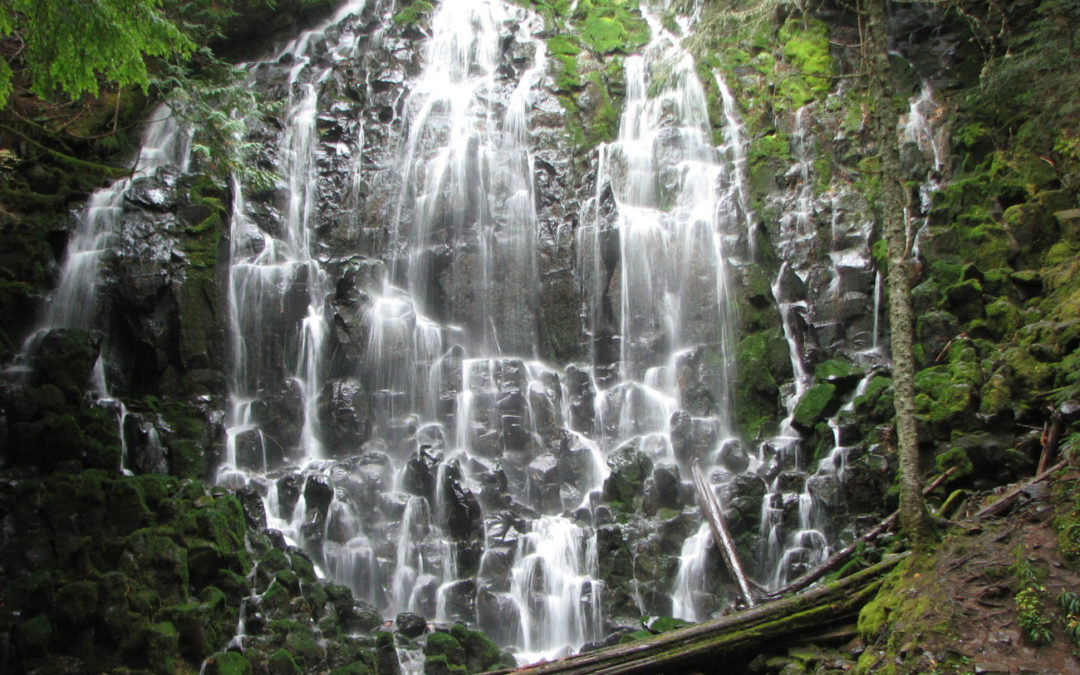Vicinity Location:
The trailhead is about 42 miles southeast of Portland, Oregon in the Mt. Hood National Forest
Directions:
From Portland take I-84 East to the Wood Village, exit (16A). Head south and turn left onto NE Burnside Rd. Heading East, Burnside will merge into Highway 26.
Follow Hwy 26 for 26.8 miles to Zigzag. When you drive past Welches, you are getting close to Lolo Pass Road. East Lolo Pass Road is just after the Hoodland Fire Station and Salmon River Road, which are both on the right and the Zigzag Mountain Store on the left. Turn left onto E. Lolo Pass Road and follow the twisty paved road for about 4.2 miles and turn right onto a paved road, just a little past the end of the road maintenance sign.
About 4.9 miles from Hwy 26, turn right and cross over the Sandy River. At about 5.3 miles is a brown road sign. Continue straight, towards the Ramona Falls Trailhead, passing the junction on the right.
At 6.6 miles is another junction and sign for the Ramona Falls Trailhead. Turn left at the junction with Forest Service Road 1825 and continue on the single lane paved road.
The road leads to a large gravel parking area. The trailhead is on the right side of the parking area.
A wilderness permit is required. The free self-registration for a wilderness permit is about 200 feet from the trailhead along the trail.
Bathrooms are available in the summer.
A Northwest Forest Park permit is required to park here.
The access road to this road is closed during the winter.
Length and Elevation:
7 miles roundtrip, elevation gain 1,000 feet and loss 17 feet to Ramona Falls. Total gain and loss is 2,034 feet. Trailhead elevation is 2,440 feet, Ramona Falls is at 3,423 feet.
Trail:
Ramona Falls Loop Trail #797, Timberline Trail #600 and overlapping with the Pacific Crest Trail #2000.
There is at least one geocache for this trail at: N 45° 23.215 W 121° 49.876 Info at Geocaching.com.
Trail Maps:
Topo Map, Download Garmin .gpx file
History:
January 16th and 17th, 2011, the pineapple express dropped over 9 inches of rain on Mt. Hood. The rain melted snow and flooded down the Sandy River. The river tore at the banks washing away rocks, trees, roads, and bridges. The river crested at 22 feet, almost 4 feet past flood stage and washed out part of Lolo Pass Road. The Sandy River also washed out access to this trailhead in November of 2006.
Review: October 30, 2011
The trail enters the woods and leads past the Wilderness area registration box. The wide trail comes out to the bank of the Sandy River. You can see evidence of erosion and undercutting. Don’t venture too close to the edge of the bank. It could collapse if you get too near the edge.
After walking along the river, the trail comes to a crossing of the Sandy River. The old bridge has been washed out and now there is a seasonal bridge which is removed in the late fall.
In 2011 there were a couple of downed trees that could be used for crossing the stream. Au-natural log crossings become dangerous after the tree has been dead a couple of years because the bark can suddenly, and without warning, slough off when you walk across the log. If the seasonal bridge is gone, the logs are gone, or crossing on the logs is too dangerous, then the creek is about a knee-deep ford. You can’t see the bottom of the stream because of the glacial silt.
Continue upstream about .25 mile to the junction of Ramona Falls Loop and the Pacific Crest Trail. Turn left at this junction and continue up the trail. The trail to the right is the return trail.
After walking about .5 mile through the pleasant forest, over Ramona Creek, and along the gently rolling landscape, you come to another junction, JCRF1, on the Ramona Falls Trail. Turn right and walk past a horse gate, a fence built to stop horses, and continue just a few hundred feet farther along, to another trail junction. A small trail leads off to the left to a hiker bridge over the Muddy Fork of the Sandy River and then to the Pacific Crest Trail. From the junction, the main trail continues southeast towards Ramona Falls gaining only about 400 feet in the next mile. The trail parallels Ramona Creek for much of the next mile, crossing over the creek a couple of times. The creek may be the prettiest in the fall when the golden leaves fall along the trail and into the stream.
The trail passes another junction just before Ramona Falls. Just downstream of Ramona Falls is a very nice log bridge over the creek. On the other side of the bridge is an area that has been trampled of most vegetation but is a lovely spot to watch the falling water.
The 120 foot waterfall cascades down a blocky basalt cliff and the water fans out across the face of the falls. This cascading water makes a wonderful sound and with the water falling down the rocks there is a below average amount of spray from the falls which allows you to linger near the falls without getting soaked from the spray.
After you’ve had your fill of Ramona Falls, continue along the trail passing through another horse gate. The forest here becomes thinner as you get farther from the stream. This section of trail passes by Rhododendron bushes.
Walk generally west about .4 miles from the falls to a junction with the Timberline Trail/Pacific Crest Trail. Turn right and head downhill with the Sandy River far below. In about a mile the trail drops down to near the level of the Sandy River and trail passes over a re-routed section of trail. The river has washed away the old trail and threatens to wash away additional portions of the trail. This is another portion where undercutting creates a dangerous edge of the riverbank.
Soon the trail comes back to the junction of Ramona Falls Loop and the Pacific Crest Trail. The river crossing is .25 mile down the trail. From here follow the same trail back along the Sandy River to the trailhead.
This hike is an easy pleasant hike through the forest along Ramona Creek to picturesque Ramona Falls. The scenery, ease of access, and easy trail make this trail the most popular dayhike on the west side of Mt. Hood.
There is a large parking lot so expect large crowds on nice weekends. This really isn’t a good hike for small children until the crossing at the Sandy River has a good bridge. The crossing can be very dangerous during spring runoffs, hot days, and mountain thunderstorms.
Enjoy the photos!!
Switchback Steve



Recent Comments